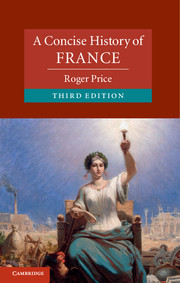Book contents
- Frontmatter
- Contents
- List of Plates
- List of Figures
- List of Tables
- Acknowledgements
- Introduction
- Part I Medieval and Early Modern France
- 1 Population and resources in pre-industrial France
- 2 Society and politics in medieval France
- 3 Society and politics in early modern France
- Part II The Dual Revolution: Modern and Contemporary France
- A short guide to further reading
- Index
3 - Society and politics in early modern France
Published online by Cambridge University Press: 05 June 2014
- Frontmatter
- Contents
- List of Plates
- List of Figures
- List of Tables
- Acknowledgements
- Introduction
- Part I Medieval and Early Modern France
- 1 Population and resources in pre-industrial France
- 2 Society and politics in medieval France
- 3 Society and politics in early modern France
- Part II The Dual Revolution: Modern and Contemporary France
- A short guide to further reading
- Index
Summary
The misery caused by the long wars against the English and widespread internal disorder encouraged the construction of an ideal of good government – a vision of a state strong enough to impose order. The glorification of monarchy by historians, artists and architects, given public expression in ritual, ceremony, the law and religion, established the image of la douce France ruled over by the ‘most Christian king’ – warrior, protector of the Church, saviour of his people. Renewed efforts were made to subdue the military nobility by offering them employment in the royal service. Although bitter disputes over taxation continued, royal impositions were gradually accepted in principle and for the ‘common good’. The closing years of the reign of Charles VII (1435–61), together with that of Louis XI (1461–83), constituted a major phase of political reconstruction, when growing economic activity facilitated a major increase in the revenue of the state, with tax income increasing from some 1.7 million livres tournois in 1439 to 2.3 million in 1449 and 5.1 million in 1482. The necessities of war and the establishment of a secure income would, from 1439, allow the creation of a permanent army of between 12,000 and 15,000 men, equipped with artillery, and reduce dependence on the feudal levy (which was finally abolished only in 1697). This constituted a first step towards the emergence of a state monopoly of armed force. The provision of military support for increasing numbers of administrative and judicial officials was a central feature of greater political centralisation. By 1515 the 16 million inhabitants of the kingdom were governed through an administrative structure that, including soldiers and dependents, gave sustenance to some 600,000 people – about 4 per cent of the total population. Nobles nevertheless continued to play a central role in the preservation of law and order. The basic administrative unit was the châtellainerie, royal or seigneurial – typically a castle, dependent lands and rights, and a single ‘custom’. In 1500 that of Pontoise included forty-three parishes. Châtelains, as well as town councils, were responsible for courts, which enforced high (capital offences), middle or low justice (property disputes, minor injuries), with communities themselves enforcing decisions. In what remained a lightly policed society, however, in which the number of agents of the king remained relatively small, ‘self-help’ was habitual and violence common.
- Type
- Chapter
- Information
- A Concise History of France , pp. 54 - 96Publisher: Cambridge University PressPrint publication year: 2014



